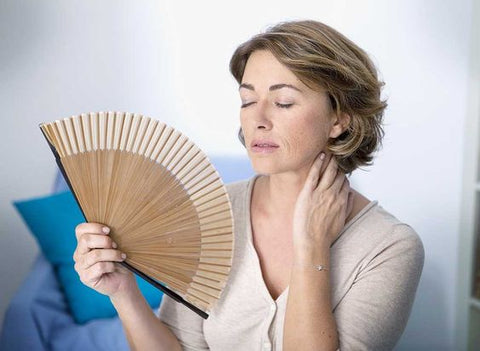This is the phase after menopause , when one year has passed since the last menstrual period has passed. It marks the end of the fertile stage and the beginning of a new cycle. The symptoms of the previous stage reduce in intensity until they disappear, but in this phase new symptoms associated with some diseases may appear.
When does Postmenopause occur?
In Spain, the age of postmenopause varies . It usually begins around the age of 51 , although the age of onset can vary between 45 and 55 years. This variability depends on various factors, such as genetics, general health status and lifestyle habits.
Life expectancy has been increasing in recent years, but our bodies were not designed to live so long. Therefore, the quality of life decreases greatly when menopause arrives. After this stage, we generally still have 30 years of life left in which it is necessary to take action to preserve the health of our body.
It is estimated that up to 80% of women experience some symptoms during this stage.

How does postmenopause affect health?
There is a total disappearance of estrogens , which leads to the loss of the protective function that this hormone exerts on the body. This absence leaves the organism more vulnerable and increases the risk of certain disorders or diseases such as:
- Osteoporosis: Decreased bone density, which increases the risk of fractures.
- Cardiovascular diseases: Increased risk of heart disease and stroke.
- Alzheimer's disease: Increased risk of cognitive decline.
- Depression: Hormonal changes can affect mood and increase the risk of depression.
- Vaginal atrophy: Thinning and fragility of vaginal tissues.
- Type 2 diabetes: Estrogen regulates blood sugar, and lowering it increases the risk of diabetes.
Postmenopause Symptoms:
While the intensity and duration of symptoms vary from woman to woman, some of the most common ones are:
- Dryness in mucous membranes and skin: Dryness in the vagina, eyes, mouth, nose and skin occurs due to an alteration in permeability that affects the hydration of these areas.
- Loss of sexual libido : Vaginal dryness and lack of sexual desire make sexual relations painful and unpleasant.
- Urinary incontinence : Involuntary loss of urine.
- Urinary tract infections: Estrogen maintains vaginal health, its lack makes it more susceptible to infections.
- Brain fog: Difficulty remembering words and numbers, disruptions in daily life, difficulty concentrating, etc.
- Insomnia: Difficulty falling or staying asleep. ( 50.7% of women)
- Fatigue: Feeling of tiredness, slowness and muscle weakness.
- Weight gain: A change in the areas where fat is stored, now accumulating in the abdominal area instead of the hips.
- Irritability and mood swings: Hormonal changes can affect serotonin levels and contribute to increased aggression.
- Nervousness: State of basal agitation that may manifest with tachycardia or palpitations, tremors, dizziness, sweating or catastrophic thoughts.
- Urinary tract infections
- Dry skin: Estrogen helps produce collagen and elastin, its absence dries out the skin.
Other less frequent symptoms in Postmenopause
- Hot flashes: Sudden sensation of heat in the upper body, often with sweating and chills. ( 39.3% of women)
- Sweating: As a response to the instability in body temperature caused by hot flashes.
- Headaches: Hormonal changes can affect blood vessels and trigger migraines.
- Anxiety: Hormonal changes and lack of estrogen can affect mood and increase anxiety.
But you are not alone!
4.3 million women in Spain and 860 million women worldwide are going through the same thing as you. It is important to remember that every woman is different and that there is no one-size-fits-all approach to postmenopause. If you are experiencing symptoms that bother you, it is best to consult your doctor so that he or she can advise you and recommend the most appropriate treatment for your case.
Postmenopause is a natural stage in a woman's life, but it doesn't have to be a negative experience. With a little information and self-care, you can navigate this stage with confidence and enjoy a full, healthy life.
Women, let's join forces:
At Madequa we have realized 2 very important things:
- There is a LOT of misinformation about this VERY long stage in a woman's life.
- There is a lot of negativity, shame and taboo surrounding this natural cycle our body goes through.
But we have come to change things, our mission is:
- Provide scientific information so that you can enjoy a well-managed menopause.
- Empowering women to get rid of social complexes and live this process naturally, with culture, strength and freedom.
If you don't identify with these data, you may be in one of the other two stages of menopause (perimenopause or postmenopause) → read the following blog and find out or take our test to better understand which stage you are in.
References:
Pronob K. Dalal and Manu Agarwal- postmenopausal syndrome. (sf). National Library Medicine. https://www.ncbi.nlm.nih.gov/pmc/articles/PMC4539866/#:~:text=Many%20symptoms%20are%20found%20related,They%20have%20been%20discussed%20below.
NHS reported. (2023, December 7). After the menopause. NHS Inform. https://www.nhsinform.scot/healthy-living/womens-health/later-years-around-50-years-and-over/menopause-and-post-menopause-health/after-the-menopause/#: ~:text=Postmenopause%20is%20the%20time%20after,to%20experience%20symptoms%20of%20menopause.




Comments (0)
There are no comments for this article. Be the first one to leave a message!